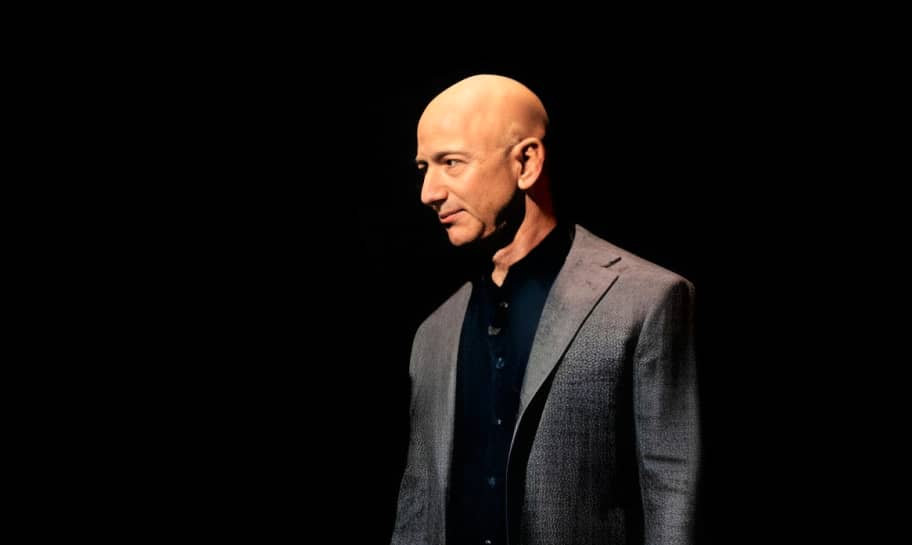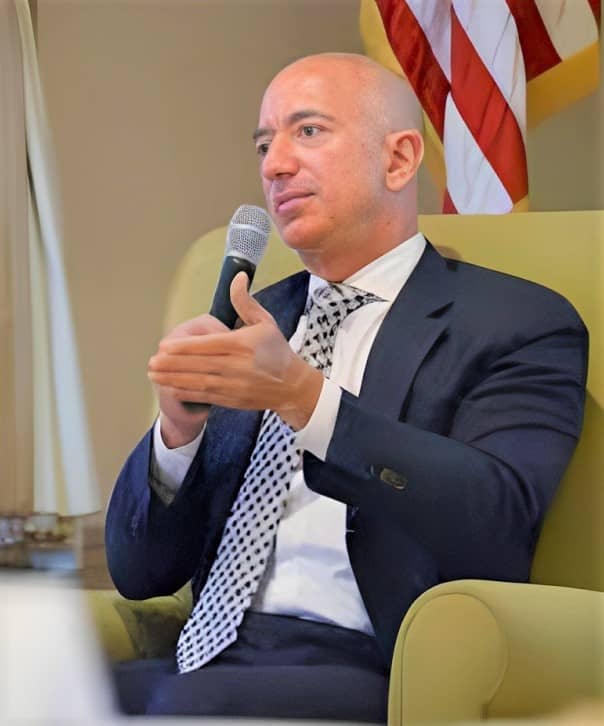Amazon CEO Jeff Bezos’s Shift to Blue Origin Focus
- According to Jeff Bezos, he left his position as CEO of Amazon in order to concentrate on Blue Origin.
- In the year 2000, Bezos established the rocket company.
Jeff Bezos left his position as CEO of Amazon two years ago. It seems he’s kept himself occupied with buying real estate and being swole during that period.
However, the billionaire claims that he left the IT company to concentrate on Blue Origin, his rocket company.
Bezos stated, “I’ve turned the CEO role over, and the primary reason I did that is so that I could spend time on Blue Origin, adding some energy, some sense of urgency,” during the most recent episode of the “Lex Fridman Podcast,” was recorded on Thursday.
In 1994, Bezos launched Amazon.com. In July 2021, he announced his resignation as CEO, while he remained executive chairman of the business.
Bezos claimed the rocket company needs to move faster, thus the decision had to be made. If Bezos continued to operate Amazon, he would not have the bandwidth to oversee Blue Origin, he informed Fridman.

“My stance on this was, ‘If I’m the CEO of a publicly traded company, it’s going to get my full attention,'” as the CEO of Amazon. Additionally, it’s simply the way that I think,” Bezos stated earlier in the podcast.
“It held great significance for me. I believed that was my duty to all of the Amazon stakeholders,” he went on.
Now that he’s mostly working at Blue Origin, Bezos claims he’s “never worked harder.”
“I am enjoying my work, but there are days that are really painful,” Bezos said to Fridman regarding his workdays following his resignation as CEO of Amazon. “I am working so hard,” he said.
“Most of my time is spent on Blue Origin and I’m so deeply involved here now for the last couple of years,” Bezos stated to Fridman. “And in the big, I love it, and the small, there’s all the frustrations that come along with everything.”

Bezos established Blue Origin in 2000, and since then, it has faced competition from companies like Virgin Galactic and SpaceX, both owned by Richard Branson. So far, the business has worked on three spacecraft: Blue Moon, New Glenn, and New Shepard.
Blue Origin said on Tuesday that it planned to send the New Shepard rocket into space the following week. Since September 2022, the rocket has been suspended due to a mid-flight malfunction that happened during a mission.
When Business Insider reached out to Blue Origin and Amazon for comment after regular business hours, the representatives did not immediately reply.
Examining Blue Origin, Jeff Bezos’ passion project, in greater detail
Past the Headlines: Although Jeff Bezos’ decision to leave Amazon and concentrate on Blue Origin made news, the tale is more complex than that. Here’s a closer look at his driving forces, the company’s goals, and the difficulties it faces:
- Bezos’s Space Vision: Bezos has regularly expressed his wish to see millions of people residing and working in space. He thinks that doing this will protect humanity’s long-term survival while simultaneously helping Earth. His means of realizing this idea is Blue Origin.
- Blue Origin’s Exuberant Initiatives: Currently, the business is developing three large spacecraft:
- New Shepard: A suborbital rocket intended for space travel has successfully concluded its mission to return to flight in December 2023.
- New Glenn: a heavy-lift launch vehicle that will likely conduct its initial test flight in 2025 and be used to loft satellites and cargo into orbit.
- Blue Moon: NASA has chosen a lunar lander for the Artemis mission, which aims to land a woman and a person of color on the moon by 2025.
Challenges and Competition: Virgin Galactic and SpaceX, two up-and-coming businesses, provide fierce rivalry for Blue Origin. Technical difficulties have also been faced by the business, such as New Shepard’s 2022 grounding.
Beyond the Technical:
- Bezos’s In-Depth Method: Even though Bezos resigned as CEO of Amazon, he continues to have a significant role in the day-to-day operations of Blue Origin. His words, “fulfilling” and “painful,” underscore the extreme commitment needed to run a business at the vanguard of space exploration.
- The Future of Blue Origin: With Bezos’s undivided focus and substantial financial support, Blue Origin is well-positioned to significantly influence the direction of space exploration in the years to come. It remains to be seen if the business can meet its lofty objectives and outperform its rivals, but it will be interesting to follow its path.
Additional Research:
- Blue Origin’s Website: https://www.blueorigin.com/
- Lex Fridman Podcast Episode with Jeff Bezos: https://www.youtube.com/watch?v=DcWqzZ3I2cY
- Article on Blue Origin’s New Shepard return-to-flight mission: https://www.reuters.com/technology/space/bezos-blue-origin-plans-new-shepard-rocket-flight-after-15-month-grounding-2023-12-12/
Blue Origin: Frequently Asked Questions
Q: What is Blue Origin?
A: commercial aerospace manufacturer and spaceflight services provider, Blue Origin was established in 2000 by Jeff Bezos. “Enable millions of people to live and work in space” is the company’s stated goal.
Q: What are Blue Origin’s main projects?
A: Blue Origin is presently developing three significant spacecraft:
- New Shepard: a suborbital rocket intended for space tourism that has taken paying passengers to the edge of space and successfully completed multiple trips.
- New Glenn: a heavy-lift launch vehicle that will likely conduct its initial test flight in 2025 and be used to loft satellites and cargo into orbit.
- Blue Moon: NASA has chosen a lunar lander for the Artemis mission, which aims to land a woman and a person of color on the moon by 2025.
Q: How is Blue Origin different from other space companies like SpaceX and Virgin Galactic?
A: In comparison to its rivals, Blue Origin approaches space exploration with a longer-term and more ambitious plan. Blue Origin seeks to build a permanent human presence in space, while Virgin Galactic offers suborbital space tourism experiences and SpaceX concentrates on reusable rockets and satellite internet.
Q: What are the challenges facing Blue Origin?
A: Blue Origin has a number of difficulties, such as:
- Technical hurdles: The company has encountered technical setbacks, such as the grounding of New Shepard in 2022 due to a mid-flight malfunction.
- Competition: Blue Origin faces stiff competition from established players like SpaceX and emerging companies like Virgin Galactic.
- High costs: Space exploration is a costly endeavor, and Blue Origin needs to continue to secure funding to achieve its ambitious goals.
Q: What is the future of Blue Origin?
A: With Jeff Bezos’s undivided focus and substantial financial support, Blue Origin is well-positioned to significantly influence space development going forward. It remains to be seen if the business can meet its lofty objectives and outperform its rivals, but it will be interesting to follow its path.
